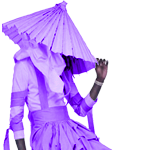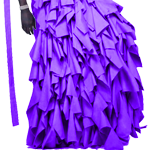- Tolkien minority
- Feb 14, 2012
-



|
I lived in Wallya for about 13 weeks during Peace Corps training, and in Gadjira/Mongo as a volunteer for two years, from 1996 until 1998. What seemed typical for Chadians when I lived in both places was similar. The closer to the capital the more access to imported things, and the farther away, the more similar people were to one another (similar clothing, culture, language, etc.). I could expand almost anywhere here, but chose these small aspects of life to give a general idea of what it is like. I have sensational stories that describe how it "can be" but those are likely more typical for me as a white woman/American than as a real idea of what it is like to live there as a regular person.
- The morning starts early, and breakfast for most is made over a three-stone fire pit, using wood or charcoal as fuel, or over a "ganoun" which is a small cone-shaped grate to hold charcoal, over which a pot can be placed. Breakfast could be rice porridge, millet dough with sauce or other foods, depending on the origin of the eater. Always there is tea (with or without milk) and always with sugar. Sometimes there are small donut-hole-like pastries ("beignets" or "cake") depending on the region.
- In Wallya, most people walk to work and everywhere else, (and from Wallya, have to cross a one-lane bridge from which one can see hippos). From the bridge, one can also see people washing clothes or bathing in the river. Some people walked over the bridge and picked up a bus or taxi. There is an obvious presence of armed military on the bridge. Almost nobody owns a car or motorcycle. There are a few bicycles.
- In the city, work could be anything from being a school teacher, to a church official, functionary, or seller in the market. There are leather-workers, butchers, and tea-makers, shoeshiners and taxi drivers in the city. Many of those going to work carry what they need for work on their heads (their chair, products they are selling, and also maybe have a child on their back).
In the smaller village, everyone was pretty much a cultivator of the food they need, and participated in some form of micro- or macro-commerce (more rare) to supplement grain, rice, and peanut needs.
- In the village, there are a few farmers who grow crops other than millet and sorghum, peanuts and rice. Some greens are gathered from trees (baby leaves), and from "en brousse" and some is bought in the market, including local cucumbers, spinach, lettuce, tomatoes, onions, garlic, and mangoes rounded out the widely available produce in the village. More rarely long, green beans, tiny bananas, and guavas were available. But expensive. Overall, green vegetables are scarce.
- Most people work relatively long hours, since they have a late afternoon break, but live too far from home to walk there midday for a break.
- Most people shop for a single day, lacking refrigeration in their home. This is either by going to the market in the capital during the day, or going to the evening market in Wallya. Women spend as wisely as possible. They compare notes on prices for things in the market daily. Shopkeepers give a "zigaygay", a small pinch of the product they are selling, as a gift, so you come back.
- Most people either went to church (weekly) or mosque (daily and/or on Friday). There were a few followers of animist beliefs.
- Houses were mostly made of mud, but some were cement blocks. Most had either mud, grass/straw or corrugated metal roofs. Most houses were surrounded by tall mud walls for protection (from animals or other people).
- Many homes had extended family living there (either who were attending school, had deceased relatives or those too poor to care for them, or who had some other reason (often employment) for being near the capital or the town center.
- Kids (at least in the households where I lived) took school lessons VERY seriously. Their family members (often older siblings) helped them with their lessons. Kids were very playful, smiling, have home-made games. Almost every one seems to play soccer with more talent than I.
- There are no sidewalks and nearly no pavement except for the main road going through town (to Cameroon).
- Food available varies from very limited in the hot season, to less limited during the harvest season. As a land-locked country, Chad has some limits on what it is able to import, and the price of imported items is really high (higher than most people can afford).
- Shoppers had to purchase plastic bags, which were smuggled from Cameroon. Most people used home-made fiber bags, either that they made or that they purchased from someone who makes them by hand. They are much more durable (and pretty).
- Women are mostly dressed in long, colorful cloth wraps they call "lafai" or a shorter wrap called a "pagna", or in waxed or non-waxed cloth clothing, made by a tailor. Color rules in women's clothes. There are prints that celebrate special events, women's groups, and cell phones.
- Men are mostly dressed in either slacks/pants and button down or t-shirts, OR in long combos consisting of long, baggy drawstrings pants and a long sleeved, very long shirt. These are made of matching, usually light-colored fabric. Dress for men and women was typically based on their region of origin.
- The day goes from sun-up (or earlier, usually for the family breakfast-makers) to sun-down (or later as the family may sit around a petrol lamp and chat before retiring. Electricity was not yet out to Wallya when I was there, but may have been extended there by now. People used petrol lamps to see at night.
- Mostly, when relaxing, people sit and lie on mats made of woven plant material, or woven plastic, which keeps out the wet in the rainy season, and these are rolled up and put inside or under cover at night. Many people sleep on them, if they lack a mattress. Some people have chairs or benches. These also are put inside at night even if the house is surrounded by a high wall. There is fear of theft.
- People are busy working during a lot of their time. People spend a lot of time talking and connecting while doing the jobs of life.
- People have to bring water to their home from a well if they do not have one. Some neighbors share. Donkeys or water carts bring water for cooking and washing for a small cost.
- Travel outside the village is rare, especially for women and children. I met many, many adult women who had never left their small village, or perhaps a 10-mile radius from where they were born, and this all on foot. When people did travel, it was almost always by "market truck", which involved a high cost (for the average person), and a place atop a truck and bags of millet, chicken baskets, other products for sale making transit, and lots of other people. It involved lots of waiting, and mechanical breakdowns, and travel over a few precarious overpasses made of old truck chassis' and wood or logs laid across them. If night fell and the driver was tired, he just stopped and you made a place to sleep (or hang out awake) in the sand. When I traveled, I was almost always looked after by another woman who kept her eye on me to make sure I did not get harassed. This was usually communicated to me with a look, at first, and then maybe bringing me something from a food vendor when we stopped briefly. I watched some amazing mechanical talent when traveling in Chad.
same
|





